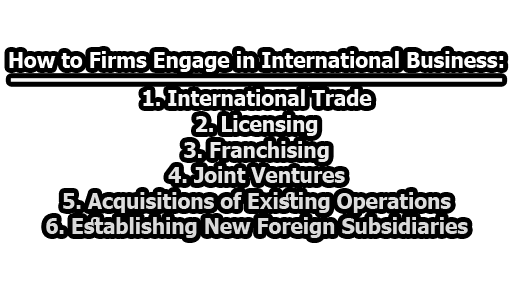Multinational Corporation (MNC)
Every country is not gifted with all the resources, so there is a need for International Business in order to export the resources or any goods/service which is abundant in our country & to import the resources which are not abundant in our country. Most companies engage in international business; to expand sales, acquire resources, minimize risk, and maximize profit. Examples of MNCs; Ford, IBM, British Petroleum, McDonald’s, Phillips, Wal-Mart Stores, Exxon Mobil, etc. In the rest of this article, we are going to know about Multinational Corporation, Company classified as an MNC, objectives of MNC, advantages and disadvantages of MNC, and how to firms engage in international business.
Definition of Multinational Corporation (MNC):
Some of the essential definitions of the multinational corporation (MNC) are being;
MNC is a parent company that engages in foreign production through its affiliates located in several countries, exercises direct control over the policies of its affiliates, and implements business strategies in production, marketing, finance, and staffing that transcend national boundaries (Franklin Root-1994).
A multinational corporation (MNC) is a company that operates in its home country, as well as in other countries around the world. It maintains a central office located in one country, which coordinates the management of all its other offices, such as administrative branches or factories (Corporate Finance Institute-CFI).
MNC is a corporate organization that owns and controls the production of goods or services in at least one country other than its home country (Wikipedia).
From the above definitions, we can say that MNC is a corporation that manages production or delivers services in more than one country.
Company Classified as an MNC:
- Subsidiaries in foreign countries;
- Operations in a number of countries;
- A high proportion of assets in or/ and revenues from global operations;
- Stakeholders are from different countries.
Objectives of MNC:
The following are the common objectives of multinational corporations:
- To expand the business beyond the boundaries of the home country.
- Minimize the cost of production, especially the labor costs.
- Avail of competitive advantage internationally.
- Aim to employ only the best managers, those who are capable of handling large amounts of funds, using advanced technology, managing workers, and running a vast business entity.
- Establish an international corporate image.
- Achieve greater efficiency by producing in the local market and then exporting the products.
- Make the best use of technological advantages by setting up production facilities abroad.
Advantages of MNC:
MNCs have several advantages that are not only beneficial to the people but also contribute to the development of the nation, some of the advantages are:
- MNCs provide an inflow of capital.
- It reduces government aid dependencies in the developing world.
- It allows countries to purchase imports.
- It provides local employment.
- It improves the local infrastructure.
- It can diversify local economies.
- It creates consistent consumer experiences.
- It encourages more innovation.
- It enforces minimum quality standards.
- It increases cultural awareness.
Disadvantages of MNC:
As there are various benefits of an MNC, also there are some drawbacks. Here are a few disadvantages of MNCs:
- MNCs create higher environmental costs.
- It doesn’t always leave profits local.
- Import skilled laborers which is not good for local laborers.
- It creates one-way raw material resource consumption.
- It encourages political corruption.
- It supports sweatshop labor.
- It removes jobs from their home country.
- Due to the lack of stringent labor laws, the employees could be exploited.
- It builds legal monopolies.
- It puts other companies out of business.
- It could pose a threat to small and local businesses.
How to Firms Engage in International Business:
1. International Trade: It is a relatively conservative approach that can be used by firms to penetrate markets (by exporting) or to obtain supplies at a low cost (by importing). This approach entails minimal risk because the firm does not place any of its capital at risk. If the firm experiences a decline in its exporting or importing, it can normally reduce or discontinue this part of its business at a low cost.
2. Licensing: Licensing obligates a firm to provide its technology (copyrights, patents, trademarks, or trade names) in exchange for fees or some other specified benefits. Licensing allows firms to use their technology in foreign markets without a major investment in foreign countries and without transportation costs. A major disadvantage of licensing is that it is difficult for the firm providing the technology to ensure quality control in the foreign production process.
3. Franchising: Franchising obligates a firm to provide a specialized sales or service strategy, support assistance, and possibly an initial investment in the franchise in exchange for periodic fees. For example, McDonald’s, Pizza Hut, etc.
How to Firms Engage in International Business:
4. Joint Ventures: A joint venture is a venture that is jointly owned and operated by two or more firms. Many firms penetrate foreign markets by engaging in a joint ventures with firms that reside in those markets. Most joint ventures allow two firms to apply their respective comparative advantages in a given project. For example, General Mills, Inc., joined a venture with Nestlé SA, so that the cereals produced by General Mills could be sold through the overseas sales distribution network established by Nestlé.
5. Acquisitions of Existing Operations: Firms frequently acquire other firms in foreign countries as a means of penetrating foreign markets. For example, American Express recently acquired offices in London, and Procter & Gamble purchased a bleach company in Panama. Acquisitions allow firms to have full control over their foreign businesses and to quickly obtain a large portion of foreign market share.
6. Establishing New Foreign Subsidiaries: Firms can also penetrate foreign markets by establishing new operations in foreign countries to produce and sell their products. This method requires a large investment. Establishing new subsidiaries may be preferred to foreign acquisitions because the operations can be tailored exactly to the firm’s needs. In addition, a smaller investment may be required than would be needed to purchase existing operations.
It is apparent that Multinational Corporations are strongly supported by economic liberalism and a free market system in a globalized international society. They create jobs and add money to the local tax base. Both at home and abroad, these companies often face critics, who perceive that the impact they have on these countries may do more harm than good.

Library Lecturer at Nurul Amin Degree College










